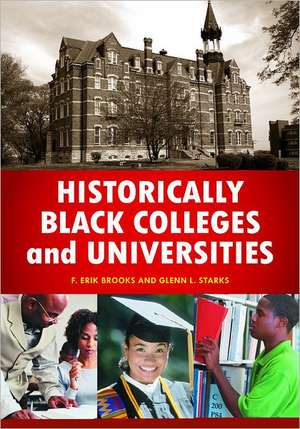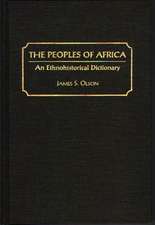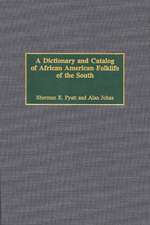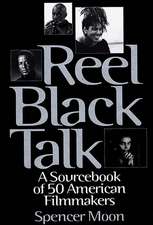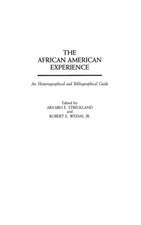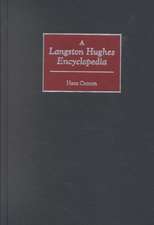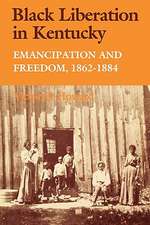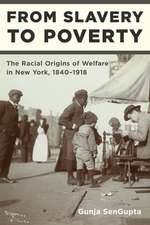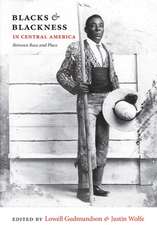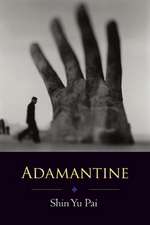Historically Black Colleges and Universities: An Encyclopedia
Autor F. Erik Brooks, Glenn L. Starksen Limba Engleză Hardback – 12 sep 2011 – vârsta până la 17 ani
Preț: 419.97 lei
Nou
Puncte Express: 630
Preț estimativ în valută:
80.36€ • 85.93$ • 67.00£
80.36€ • 85.93$ • 67.00£
Carte disponibilă
Livrare economică 27 martie-10 aprilie
Preluare comenzi: 021 569.72.76
Specificații
ISBN-13: 9780313394157
ISBN-10: 0313394156
Pagini: 388
Ilustrații: 17 bw illus
Dimensiuni: 178 x 254 x 28 mm
Greutate: 0.93 kg
Ediția:New.
Editura: Bloomsbury Publishing
Colecția Greenwood
Locul publicării:New York, United States
ISBN-10: 0313394156
Pagini: 388
Ilustrații: 17 bw illus
Dimensiuni: 178 x 254 x 28 mm
Greutate: 0.93 kg
Ediția:New.
Editura: Bloomsbury Publishing
Colecția Greenwood
Locul publicării:New York, United States
Caracteristici
A complete timeline of events extending from the founding of the first HBCU in 1837 through the 21st century
Notă biografică
F. Erik Brooks, PhD, is associate professor at Georgia Southern University, Statesboro, GA.Glenn L. Starks, PhD, is a senior manager with the Department of Defense.
Cuprins
PrefaceIntroductionTable 1: Four-Year Accredited Historically Black Colleges and Universities in the United States as of 2010 (Public and Private)Table 2: Two-Year Accredited Historically Black Colleges and Universities in the United States as of 2010 (Public and Private)Time Line of Major Events Impacting Historically Black Colleges and UniversitiesCheyney University of PennsylvaniaAvery CollegeUniversity of the District of ColumbiaLincoln UniversityWilberforce UniversityHarris-Stowe State UniversityExpansion of Historically Black Colleges and Universities after the Civil WarSocial Change and Two Dominate Approaches to Early African American EducationBowie State UniversityVirginia Union UniversityShaw UniversityEdward Waters CollegeLincoln University of MissouriRust CollegeFisk UniversityAlabama State UniversitySt. Augustine's CollegeFayetteville State UniversityMorehouse CollegeJohnson C. Smith UniversityHoward UniversityTalladega CollegeMorgan State UniversityBarber-Scotia CollegeHampton UniversityDillard UniversityTougaloo CollegeClaflin UniversityAllen UniversityBenedict CollegeLeMoyne-Owen CollegeAlcorn State UniversityPaul Quinn CollegeBennett CollegeUniversity of Arkansas at Pine BluffWiley CollegeKnoxville CollegeAlabama A&M UniversityMeharry Medical CollegePrairie View A&M UniversityStillman CollegeThe Hatch Act of 1887 and the Morrill ActsPhilander Smith CollegeJackson State UniversitySelma UniversityFlorida Memorial UniversityLivingstone CollegeSpelman CollegeTuskegee UniversitySouthern University and A&M CollegeMorris Brown CollegeVirginia State UniversityLane CollegePaine CollegeArkansas Baptist CollegeKentucky State UniversityVirginia University of LynchburgUniversity of Maryland Eastern ShoreFlorida A&M UniversityCentral State UniversitySaint Paul's CollegeSavannah State UniversityDelaware State UniversityElizabeth City State UniversityNorth Carolina A&T State UniversityWest Virginia State UniversityWinston-Salem State UniversityTexas CollegeFort Valley State UniversityBluefield State CollegeSouth Carolina State UniversityOakwood UniversityLangston UniversityVoorhees CollegeMiles CollegeThreats to the Survival of Black Higher EducationThe 1920s and 1930s and Historically Black CollegesThe 1940s and 1950s and the Use of Black College Graduates to Integrate White CollegesCoppin State UniversityGrambling State UniversityAlbany State UniversityBethune-Cookman UniversityMorris CollegeNorth Carolina Central UniversityTennessee State UniversityJarvis Christian CollegeXavier University of LouisianaConcordia CollegeNorfolk State UniversityTexas Southern UniversitySouthwestern Christian CollegeMississippi Valley State UniversityHuston-Tillotson UniversitySouthern University at New OrleansUniversity of the Virgin IslandsMorehouse School of MedicineClark Atlanta UniversityThe Student Nonviolent Coordinating Committee (SNCC)Congress of Racial Equality (CORE)Student Protests at HBCUs and Other Colleges and UniversitiesHBCUs and Modern-Era Desegregation CasesAdams v. RichardsonSanders v. EllingtonUnited States v. FordiceUnited States v. LouisianaKnight v. AlabamaHBCUs and Black Greek Lettered OrganizationsAlpha Phi Alpha Fraternity, Inc.Kappa Alpha Psi Fraternity, Inc.Omega Psi Phi Fraternity, Inc.Phi Beta Sigma Fraternity, Inc.Iota Phi Theta Fraternity, Inc.Alpha Kappa Alpha Sorority, Inc.Delta Sigma Theta SororityZeta Phi Beta Sorority, Inc.Sigma Gamma Rho Sorority, Inc.HBCUs and Fraternities and Sororities in the 1980s and 1990sHBCUs in Pop CultureHBCUs and AthleticsThe Central Intercollegiate Athletic Conference (CIAA)The Southern Intercollegiate Athletic Conference (SIAC)The Southwestern Athletic Conference (SWAC)The Mid-Eastern Athletic Conference (MEAC)The Current Status of HBCUsEnrollment, Administration, and SupportHBCUs and College RankingsHBCUs and the Economic DownturnThe Plight of HBCUsWhat HBCUs Should DoAdhere to Standard Accounting PracticeDevelop Diverse Revenue StreamsDiversify Their Student PopulationsTake Advantage of Technology and Distance LearningMore Transparency in GovernanceAdvertise Their CompetitivenessInstitutional CollaborationConclusionTable A: Notable Alumni of Historically Black Colleges and UniversitiesExecutive Order 13532 as of February 26, 2010: Signed by President Barack ObamaExecutive Order 13256 as of February 12, 2002: Signed by President George W. BushExecutive Order 12928 as of September 16, 1994: Signed by President William J. ClintonExecutive Order 12876 as of November 1, 1993: Signed by President William J. ClintonExecutive Order 12677 as of April 28, 1989: Signed by President George H. W. BushExecutive Order 12320 as of September 15, 1981: Signed by President Ronald ReaganExecutive Order 12232 as of August 8, 1980: Signed by President Jimmy CarterExcerpts from Public Law 88-352, Civil Rights Act of 1964 by the 88th Congress of the United StatesExcerpt of U.S.C. Chapter 28-Higher Education Resources and Student Assistance (Higher Education Act)1986 Amendment to Improve Support to HBCUs20 U.S.C. Sec. 1066f. HBCU Capital Financing Advisory Board10 U.S.C. Sec. 2323. Contract Goal for Small Disadvantaged Businesses and Certain Institutions of Higher EducationExcerpt from the College Cost Reduction and Access Act of 2007, Public Law 110-84Brown v. Board of Education (1954)BibliographyResourcesIndex
Recenzii
This is an excellent primary source for undergraduates to use in beginning research. . . . Summing Up: Highly recommended.
Historically Black Colleges and Universities: An Encyclopedia is a book for everyone and makes an invaluable contribution to literature that examines HBCUs. In a time of budgetary crises in higher education, this book is necessary, particularly for policymakers and the general public to better understand the need for support of such schools. Furthermore, this book serves scholars well as a current, comprehensive publication of the study of HBCUs. Scholars, joumalists, and policymakers (Kimbrough, 2011) have raised the question: Why do we still need HBCUs? This comprehensive and thoughtful encyclopedia answers the question well. HBCUs are not only necessary but also valuable in shaping the narrative of African American history in the way that previous landmark decisions and events have done.
Historically Black Colleges and Universities: An Encyclopedia is a book for everyone and makes an invaluable contribution to literature that examines HBCUs. In a time of budgetary crises in higher education, this book is necessary, particularly for policymakers and the general public to better understand the need for support of such schools. Furthermore, this book serves scholars well as a current, comprehensive publication of the study of HBCUs. Scholars, joumalists, and policymakers (Kimbrough, 2011) have raised the question: Why do we still need HBCUs? This comprehensive and thoughtful encyclopedia answers the question well. HBCUs are not only necessary but also valuable in shaping the narrative of African American history in the way that previous landmark decisions and events have done.
